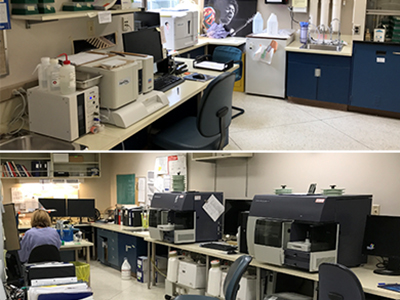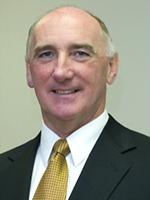
Precision medicine lab researchers to tailor genetic therapies for immune disease.
It’s being called the future of health care. Precision, or personalized, medicine based on a patient’s individual genetic profile, is revolutionizing treatment and diagnosis of disease. VCHRI Research Scientist Dr. Paul Keown and his colleagues have big plans to play a pivotal role in this genetic revolution. Their focus is on immune disease and transplantation. The team is midway through an approval process to transform the Immunology Lab at VGH into a Precision Medicine Core, which would provide sophisticated, state-of-the-art molecular testing to health researchers and patients across Canada.

“This work applies advanced genomic technologies to complex immune disease. We want to understand the molecular mechanisms in each disease that cause the immune system to malfunction. We can then use that information to target specific therapies, ” says Keown.
Keown says the new technologies could transform treatment for diseases like multiple sclerosis and lupus. It could also combat immune system rejection of organ transplants. The new lab, with DNA sequencing machinery, would focus on stem cell transplantation, solid organ transplantation (e.g., heart, lung kidney, pancreas, liver) and a range of immune disorders (e.g., rheumatoid arthritis and other inflammatory and auto-immune diseases).

The team will build on its own success: the current lab was the first in Canada to implement next-generation sequencing for Human Leucocyte Antigens (HLA), the genes which regulate the immune system. This work was partly enabled by a VCHRI research grant to identify biomarkers for optimizing anti-rejection drugs for transplant patients.
We’re moving almost everything to a genetic level—looking at the specific genes that cause or aggravate organ rejection. We’ve already identified them by their sequence and now we are discussing ways to match donors and recipients at a genetic level.
Keown says doctors will one day be able to track and treat—on a cellular level, with tailor-made molecular drugs—the body’s response to transplanted organs before physiological symptoms are noted and irreversible damage happens. He says the advances have huge implications for drug therapies in all disease treatment.
“We’re asking: what are the genetics that control how each person handles drugs? Currently, we give all patients the same doses and the same medications. Now our genetic data is telling us this is almost certainly wrong."
We are seeing up to a 10 times difference in how two individuals absorb the same drug. It’s like Goldilocks and the Three Bears. We want to get it just right for each person.
From a drop of blood to a string of DNA
When Keown was in medical school, researchers had just begun to understand the rare genetic diseases that newborn heel prick tests now screen for. “We now intervene immediately with newborns to prevent severe disability later on. We think we will see the same opportunity with precision medicine: we will be able to take a sample at birth, sequence the DNA, and identify the diseases for which that child is at risk. Then we can act early and precisely. It’s a revolution not only in prevention, but in treatment.”
These genetic advances have profound meaning for Keown, who was the first director of the BC Transplant Society 30 years ago. Many of the disorders that create a need for organ donations—like kidney disease, which makes up the majority of transplants in BC—may have a genetic origin.
Keown hopes one day, transplant researchers like him will be out of a job, as precision technology and precision drugs find, treat and potentially cure more disease. “I’m extremely fortunate to be part of such an exciting field of study, where progress is made every day.” Keown hopes the new precision medicine lab will be operational in 2018.


